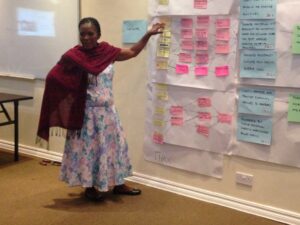I don’t know, but I’ll try to find out
Blog post by GUY SHARROCK and is shared generously by The Ideal Practitioner.
This post is inspired by the conversation started by Joanna and others (past weeks). I really appreciate the ideas that have been posed and I too would love to discuss more about this, as we have much to learn. Meanwhile, here are a few thoughts from our tentative steps in this area at Catholic Relief Services.
I am particularly struck when you write below about, “the ability to be self-reflexive and critically inquire into our own practice, perceptions and assumptions…a willingness to consistently learn from the experiences and knowledge of others, to be able to convene and facilitate spaces which include the voices of the most marginalised, and being willing to adapt and change your practice where necessary.” That certainly resonates with what we have been trying to do. One example: we have recently developed a competency model for ‘MEAL’ (monitoring, evaluation, accountability and learning) that includes one labelled ‘Analysis and Critical Thinking’. In the model we describe this particular competency as, “…challenging biases and assumptions, posing thoughtful questions, pursuing deeper understanding of evidence through reflection and perspective-taking…” I think this sounds very much aligned to what you have written.
Much of our current thinking and pilot activity has come about as a result of an ongoing collaboration with colleagues at Virginia Tech and the Cornell Office for Research in Evaluation who have written much on ‘evaluative thinking’ (ET), essentially critical thinking applied to MEAL. With them, our current approach to strengthening staff and partner capacity in this area has been informed by the writings of Stephen Brookfield who has written extensively on critical thinking.Surfacing assumptions, being open to multiple perspectives, being open to saying ‘I don’t know, but I’ll try to find out’, a sense of modesty and humility about the development endeavor, all with a view to trying to navigate a complex pathway is core to this work.
If this early approaches show promise, then one aim is to find ways to infuse this way of thinking in the fabric of our agency systems (programmatic, operational, etc). We agree with Patton when he writes that “embedded evaluative thinking creates lasting impact.” We hope that in time all project staff and partners – from frontline to head office – will be defined not merely as ‘aid deliverers’ but more valuably as ‘reflective practitioners’ who are encouraged to contribute to project decisions.
Some early and tentative (!) lessons to date are that: 1/ Staff already possess the ability to be self-reflexive, but there are potential significant benefits arising from encouraging and enabling greater intentionality in its practise; 2/ critical, or evaluative, thinking requires a mindset that embraces unpredictability and uncertainty. I recently saw a ‘gaping void’ cartoon that said, “Nothing changes until mindset changes.’ How true that feels, and we have recently begun working with our ‘leadership’ to effect the kinds of changes in mindset we are seeking. 3/ Our hunch is that this kind of thinking will inspire and, arguably provide a conduit for, the emergence of demand-led adaptive practices. Our work to date hints strongly at the prospect of evaluative thinking serving as a vehicle for greater frontline staff and community member involvement in development processes; 4/ A whole-system response is required to ensure ‘complexity-aware development’. As it is currently construed, development work presents practitioners with a Sisyphean challenge: to foster in short order positive social transformation in a context of endemic unpredictability. Once again, thanks for the stimulating conversation and food for thought. Best wishes,
GUY SHARROCK IS SENIOR ADVISOR FOR LEARNING AT CATHOLIC RELIEF SERVICES (CRS). HE HAS WORKED FOR CRS SINCE 2001, PRIMARILY AS SENIOR MONITORING AND EVALUATION ADVISOR (2001-2013), THEN LATTERLY IN HIS CURRENT POSITION. DURING THIS TIME GUY HAS WITNESSED AN EXPANSION IN M&E ACTIVITY ACROSS 90+ COUNTRY PROGRAMS, AND IMPROVEMENTS IN M&E CONSISTENCY AND QUALITY. EVALUATIVE THINKING CAPACITY-BUILDING IS NOW A PARTICULAR INTEREST, ESPECIALLY AMONG FRONTLINE STAFF. GUY IS BASED IN ENGLAND AND IS A FELLOW OF THE ROYAL GEOGRAPHICAL SOCIETY. HE HAS MASTER’S DEGREES IN AGRICULTURAL ECONOMICS AND IN ENVIRONMENTAL AND RESOURCE ECONOMICS FROM UNIVERSITY COLLEGE LONDON.
- Making Public Deliberations Inclusive with Mixed Methods AR - October 26, 2020
- Participatory action research with Aboriginal Elders: Ngulluk Koolunga Ngulluk Koort project - October 12, 2020
- Bringing the relational self to ART: Interview with Dr. Yvonne Skipper - October 1, 2020


